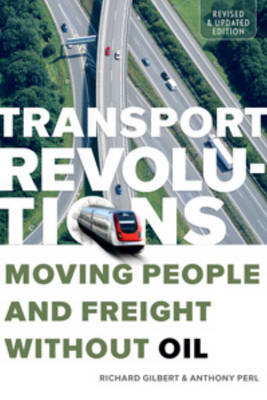
Transport Revolutions
Moving People and Freight without Oil
Seiten
2010
|
2nd
New Society Publishers (Verlag)
978-0-86571-660-5 (ISBN)
New Society Publishers (Verlag)
978-0-86571-660-5 (ISBN)
- Keine Verlagsinformationen verfügbar
- Artikel merken
Modern societies rely almost entirely on oil for moving people and freight. This book analyses five episodes of rapid and radical change in the way people and goods have travelled. It examines the world-wide state of transport today, especially its energy use and its impacts, positive and negative.
Modern societies now rely almost entirely on oil for moving people and freight. The impacts on transport of scarcer and more expensive oil pose major challenges to humanity. They require revolutions in our thinking about mobility, and consequent changes in all forms of transport. This book analyses five episodes of rapid and radical change in the way people and goods have travelled. It examines the world-wide state of transport today, especially its energy use and its impacts, positive and negative. The authors then show, focusing on the United States and China, how ample movement of people and freight could be sustained beyond 2025 with much-reduced dependence on oil. Preparations for the end of cheap oil include: substantial use of electricity to power land transport; use of wind to help power water transport; reduced movement of people and goods by air; and, new approaches to transport planning, finance, and management. Written for transport professionals, planners, policymakers, managers, and investors, this book will appeal to all who need to keep ahead of mobility changes.
Modern societies now rely almost entirely on oil for moving people and freight. The impacts on transport of scarcer and more expensive oil pose major challenges to humanity. They require revolutions in our thinking about mobility, and consequent changes in all forms of transport. This book analyses five episodes of rapid and radical change in the way people and goods have travelled. It examines the world-wide state of transport today, especially its energy use and its impacts, positive and negative. The authors then show, focusing on the United States and China, how ample movement of people and freight could be sustained beyond 2025 with much-reduced dependence on oil. Preparations for the end of cheap oil include: substantial use of electricity to power land transport; use of wind to help power water transport; reduced movement of people and goods by air; and, new approaches to transport planning, finance, and management. Written for transport professionals, planners, policymakers, managers, and investors, this book will appeal to all who need to keep ahead of mobility changes.
Richard Gilbert is a consultant and retired municipal politician with The City of Toronto, who has authored, co-authored and edited 14 books, including Sustainable Transport In Hong Kong, as well as numerous government books and journals. He lives in Toronto, Ontario. Anthony Perl is the Director of Urban Studies at Simon Fraser University. He has acted as government advisor in Australia, Belgium, Canada, France and the US on transportation and environmental research. He has co-edited and co-authored four books including The Integrity Gap: Canada's Environmental Policy and Institutions. He lives in Vancouver.
| Zusatzinfo | Illustrations |
|---|---|
| Verlagsort | Gabriola Island |
| Sprache | englisch |
| Maße | 155 x 230 mm |
| Gewicht | 748 g |
| Themenwelt | Naturwissenschaften ► Biologie ► Ökologie / Naturschutz |
| Technik | |
| ISBN-10 | 0-86571-660-9 / 0865716609 |
| ISBN-13 | 978-0-86571-660-5 / 9780865716605 |
| Zustand | Neuware |
| Haben Sie eine Frage zum Produkt? |
Mehr entdecken
aus dem Bereich
aus dem Bereich


